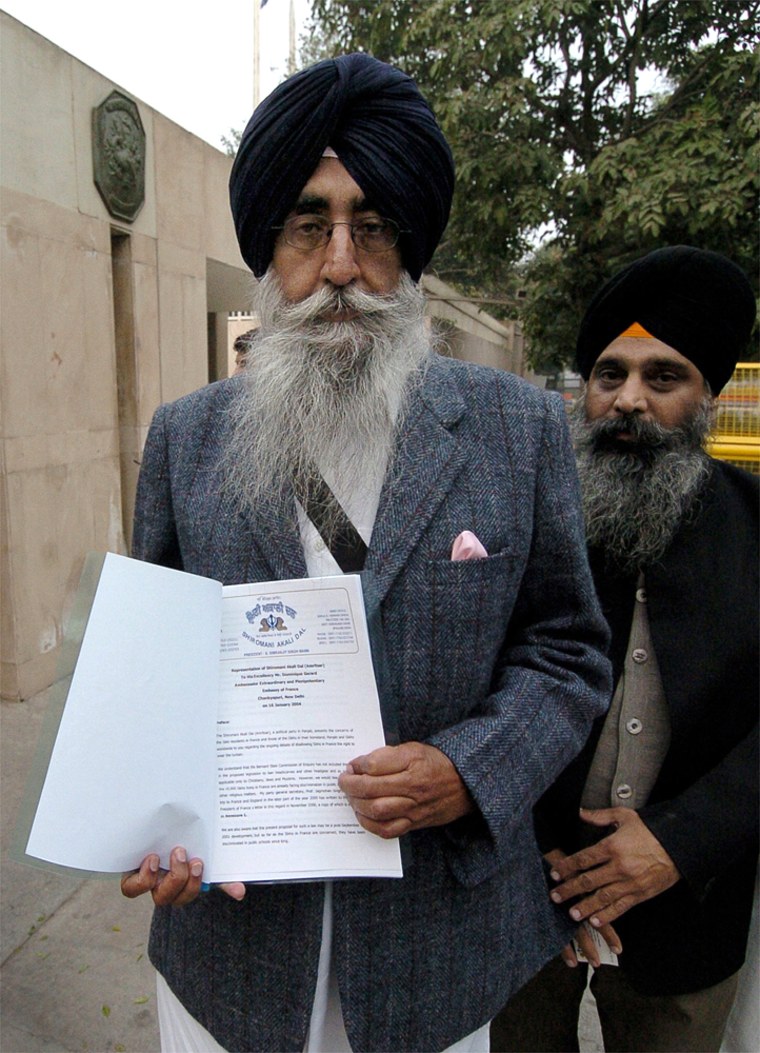France’s plan to bar religious symbols from state schools took a further confusing turn Wednesday when the education minister said a proposed ban on Muslim veils could also outlaw beards and bandannas if they were judged to be a sign of faith.
Opposition politicians have derided the government plan as misguided and some of President Jacques Chirac’s conservative allies said they would abstain or vote against the law meant to stem growing Islamist influence among some of France’s five million Muslims.
Education Minister Luc Ferry made the surprising statement about disciplining bearded students on Tuesday in a National Assembly legal committee hearing about the draft law on the ban due to be debated next month.
Discussing the plan to remove Islamic headscarves from state schools, he told a communist deputy who asked about a pupil with a beard, “As soon as it becomes a religious sign and the code is apparent, it would fall under this law.”
His comments effectively blocked a compromise sought by the head of France’s Council for the Muslim Faith, Dalil Boubakeur, to let Muslim girls wear bandanas or hairbands if they could not cover their hair, neck and shoulders with Islamic veils.
Pious Muslim men wear beards in obedience to the Prophet Mohammad, who is said to have instructed them to do so.
Khalil Merroun, rector of the large Evry mosque south of Paris, said the veil debate was difficult enough without Ferry’s comments on beards. “Let’s not pour oil on the fire,” he said Wednesday.
Sikhs -- of whom there are over 5,000 in the Paris area --also wear beards because they do not cut their hair. Ferry said they might still be able to wear discreet turbans to school but did not mention their facial hair.
Abstention threatenedClaude Goasguen, deputy leader for Chirac’s UMP party in parliament, said he was considering abstaining from the vote. Centrist Francois Bayrou denounced the planned ban as “a whiff of oxygen for fundamentalists” who would exploit it to whip up protests.
Socialist deputy Julien Dray declared Tuesday, “This is putting a comic face on a very serious issue.” Socialist parliamentary leader Jean-Marc Ayrault said the government’s position “is not clear at all.”
Explaining the draft law to deputies, Ferry said the text would bar “signs and clothes which conspicuously manifest the religious affiliation of the pupils.” Officials have said this means it would outlaw Muslim veils, Jewish skullcaps and large Christian crosses.
But drafters chose to use this broad wording rather than draw up a list of banned symbols so pupils could not bypass the law by wearing other items that clearly have a religious significance but were not expressly forbidden, Ferry said.
France has reaped widespread criticism for the ban, which it says will keep religion out of state schools and thus promote respect for all religions. Many commentators abroad cannot fathom this logic and accuse Paris of violating religious freedom.
France’s Muslim community, the largest in Europe, has said it feels targeted by the ban and launched demonstrations against it. Local Christian and Jewish religious leaders have also criticized it.
Excessive secularism?Pope John Paul II weighed into the debate last week with a warning about what he considered excessive secularism in some European countries, a clear jibe at France.
Bernard Stasi, who led a commission that first proposed the ban on religious symbols in state schools, wrote in the daily Le Monde that the Polish-born pontiff was misinformed about France and should not give fundamentalists ammunition against Paris.
Meantime, some Sikhs welcomed the minister's comment that Sikhs could keep the headwear if it is discreet.
“This is good news,” said Chain Singh, spokesman for about 5,000 followers of Sikhism -- a monotheistic religion born in India in the 15th century -- living in the Paris area.
Ferry did not, however, make clear whether Sikhs could wear turbans themselves or only the “patka” scarf worn underneath. Sikhs also wear beards as they do not cut their hair.
Singh said Sikhs renewed their appeals to the government after Ferry’s statement.
Jasdev Singh Rai, a London-based Sikh rights activist, said he would press the religion’s case at the Education Ministry later on Wednesday. Rai held talks at the foreign and interior ministries last week which he described as positive.
He told Reuters the proposed law, which France says is needed to stem a trend towards Islamic radicalism among some of its five million Muslims, wrongly threw turbans, veils, kippas and crosses into the same pot as religious paraphernalia.
“There is almost an Orientalism here -- the West defines who we are and we have to live by it,” said Rai, who was appointed by the Golden Temple -- Sikhism’s holiest shrine, in Amritsar, India -- to lobby the French government for an exemption.
Rai said turbans were not religious as such and a ban on them would violate a paragraph in the 2001 United Nations Global Action Plan Against Racism meant to protect certain groups with distinct cultural identities from discrimination.
“Sikhs here are victims of the shortcomings of Western language and categories. Secular language has its limits and it has found them with us,” he said.
